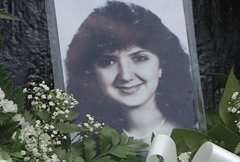
September 23, 2006
Florida
College students' killer to be executed
Gov. Jeb Bush signed the death warrant to execute Danny Rolling, the man who
murdered five students in Gainesville.
BY GARY FINEOUT AND STEPHANIE GARRY, Miami Herald
TALLAHASSEE - Danny Rolling, the notorious serial killer who murdered five
college students and plunged the town of Gainesville into a frenzy of fear
16 years ago, will be executed next month, Gov. Jeb Bush said Friday.
The governor signed a death warrant to execute Rolling, who joined Ted Bundy
and Aileen Wuornos in the history books as Florida's most horrific killers.
Rolling, 52, exhausted all of his appeals in June and is scheduled to be
strapped to a gurney and given an injection of deadly chemicals at 6 p.m.
Oct. 25.
In quick succession in August 1990, Rolling killed five students, four of
them young dark-haired women, the other the male roommate of one of the
victims. He raped three of the women, then stabbed and mutilated them. He
decapitated one of the victims and left the head on a shelf facing the front
door, posed for police to see.
The five bodies were found on successive days as the fall semester began at
the University of Florida. All five victims were students at UF or nearby
Santa Fe Community College.
GROWING HYSTERIA
With each discovery, fear turned into terror, which rose to hysteria.
Students bought baseball bats, Mace and guns. Parents jammed telephone
lines, urging their children to come home. Several hundred students left
that semester and never returned.
Rolling's victims: Christi Powell, 17, of Jacksonville; Sonja Larson, 18, of
Deerfield Beach; Christa Hoyt, 18, of Gainesville; Tracy Paules, 23, of Palm
Springs North, and Manny Taboada, 23, of Carol City.
''We don't much care if they burn him, stick him or hang him, as long as
they kill him,'' George Paules, father of Tracy Paules, told The Associated
Press.
Tommy Carroll, a childhood friend of Paules and Taboada who was the first to
find their bodies, told The Miami Herald Friday evening that Rollings was
``an animal.''
''We've been looking forward to this day for so long,'' he said. He said of
Rolling's execution: ``We will be there. I want to be inside and watch it.''
''It's far past time for Danny Rolling to face justice,'' said Rod Smith,
now a state senator from Alachua, who as state attorney prosecuted Rolling.
``The victims have waited for far too long.''
Art Sandeen, UF's vice president for student affairs at the time of the
murders and now a professor at the university, said he doesn't believe in
the death penalty. But for those who do, he said, he hopes the governor's
decision will bring some closure.
''It'll always be a part of everybody's life who was here,'' he said Friday.
``It was the worst of times. Those feelings for those five people will never
go away.''
Sandeen pointed out that most current UF students were 3 or 4 years old at
the time of the murders.
''Frankly, I'd be happy that this generation of students for the most part
is probably fairly unaware that this took place,'' he said. ``It's part of
the institutional memory, that's for sure.''
Rolling, a drifter from Shreveport, La., camped in a wooded area near the
apartments where the students lived off campus. Shortly after the killings,
he fled town and went to Tampa and then Ocala.
MASSIVE INVESTIGATION
With police engaged in a massive investigation in Gainesville, no one
noticed when Rolling was arrested on charges he robbed an Ocala Winn-Dixie
in September 1990. He pleaded guilty to the crime. It wasn't until months
later that blood tests linked Rolling to the Gainesville murders. He is also
suspected of three killings in Shreveport, but was never prosecuted.
Rolling pleaded guilty to the Gainesville murders in 1994, and his case
wound its way through the legal system until his appeals ran out in June.
State officials said the delay was partly due to the legal battle over
lethal injection. The U.S. Supreme Court halted the execution of cop-killer
Clarence Hill in January after his attorneys raised questions as to whether
the deadly combination of chemicals used in lethal injection caused pain.
Hill was executed Wednesday after courts rejected his arguments over lethal
injection.
Today, the biggest reminder of the Gainesville murders is not the apartment
complexes where the killings happened, but the black-and-white memorial on a
graffitied wall on 34th Street, a main thoroughfare that runs along the west
side of the UF campus.
Few messages escape the constant painting of the wall, but the about
10-foot-long black section bears the words ''We remember,'' and in white,
the names of the five victims.
Gatorwood Apartments, where Rolling killed his last two victims, has been
closed. In the past month, it has been set on fire twice for local
firefighters to practice on.
---
Source : Miami Herald
http://www.miami.com/mld/miamiherald/news/15590187.htm
1 comment:
Wow, Fantastic Blog, it’s so helpful to me, and your blog is very good,
Post a Comment